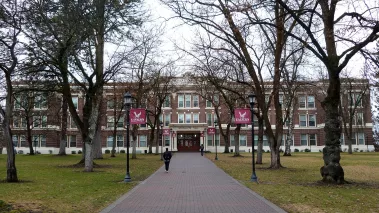Table of Contents
Eastern Washington University unblocks critics on social media

Ian Poellet / Shutterstock.com
Looks like Eastern Washington University isn’t a “dumpster fire” after all, at least when it comes to the First Amendment.
Last May, EWU history professor Larry Cebula tweeted that “#EWU is still a dumpster fire, caused by the admin gutting every campus office to find even more money for the football team. Campus offices at half-staff, impossible to order equipment or hire student workers or get support for essential tasks.”
In response, the university blocked him from its official Twitter account, @EWUEagles.
Blocking, hiding, or otherwise discriminating against content on social media based on its viewpoint violates the First Amendment.
In a statement to The Spokesman-Review, EWU Director of Communications & Media Relations Dave Meany claimed EWU blocked Cebula because his “tweet was inaccurate and could harm EWU’s reputation and enrollment.” Meany promised the school would continue blocking social media users who run afoul of its social media policy, which allows the school to “monitor all content posted to its social media sites” and to “remove any content . . . it deems discriminatory; harassing; threatening; obscene; defamatory, slanderous, false, or misleading; a violation of copyright or privacy laws, a violation of Washington State Ethics or privacy laws, or otherwise injurious or illegal.”
On March 9, FIRE sent a letter to EWU addressing Meany’s comments. Citing Ninth Circuit precedent that the interactive sections of government actors’ social media pages are public forums, the letter reminded the university that blocking, hiding, or otherwise discriminating against content on social media based on its viewpoint violates the First Amendment.
We also pointed out to EWU that its social media policy is unconstitutional as written. While some of the objectionable content listed constitutes legally unprotected speech — harassment, true threats, obscenity, defamation — much of it falls firmly within the First Amendment’s protection. The policy also leaves far too much discretion in the hands of university administrators to determine what speech is or is not permitted.

No Comment: Public Universities' Social Media Use and the First Amendment
FIRE surveyed 200 public universities about how they filter or block content and users on their official Facebook and Twitter accounts.
In response, EWU President Shari McMahan announced that, as of March 13, the school has unblocked accounts it had previously blocked. Additionally, EWU committed to revising its social media policy to comply with its First Amendment obligations. While President McMahan cautioned that any new policy would take time to implement, she promised “EWU staff will be instructed to follow the new draft policy in the interim.” She estimates the new policy will be in place by the fall or winter of 2023.
FIRE appreciates EWU’s prompt response and is looking forward to updating this page if and when the university approves a new social media policy. For more on the First Amendment’s application to these social media spaces, see our 2020 report on how public institutions limit speech on their official social media accounts.
If your institution’s social media policy is not in line with its constitutional obligations or promises of free expression, FIRE is here to help.
FIRE defends the rights of students and faculty members — no matter their views — at public and private universities and colleges in the United States. If you are a student or a faculty member facing investigation or punishment for your speech, submit your case to FIRE today. If you’re a faculty member at a public college or university, call the Faculty Legal Defense Fund 24-hour hotline at 254-500-FLDF (3533). If you’re a college journalist facing censorship or a media law question, call the Student Press Freedom Initiative 24-hour hotline at 717-734-SPFI (7734).
Recent Articles
Get the latest free speech news and analysis from FIRE.

FIRE's 2025 impact in court, on campus, and in our culture

The trouble with banning Fizz

VICTORY: Court vindicates professor investigated for parodying university’s ‘land acknowledgment’ on syllabus


